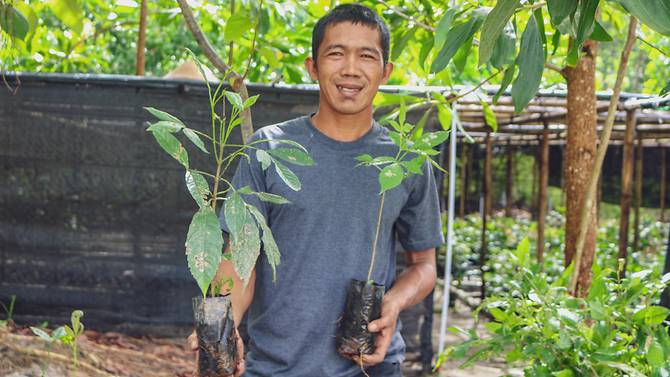JAKARTA: Every month, Indonesian Hamisah drives her 78-year-old mother to Alam Sehat Lestari (ASRI) clinic in West Kalimantan province so her mother can receive medical care.
-Advertisement-
The duo will always remember to bring a seedling with them when they travel to North Kayong regency.
“My parents usually seek treatment at ASRI by paying with a seedling,” Mdm Hamisah, who goes by one name, told CNA.
“Many do the same and people in North Kayong have been helped by the presence of ASRI clinic which allows people to pay not with money.”
Her 82-year-old father also goes to the same clinic. He pays for his medical care using a seedling of his personal choice such as mango, rambutan or dogfruit.
Working together with its US-based sister organisation Health in Harmony, ASRI clinic gives people medical care, even though they do not have deep pockets.
It aims to give healthcare while conserving forests, especially around the carbon-rich peat swamp Gunung Palung National Park. The national park is home to the endangered orangutan.
Since 2007, it has served the population of about 120,000 people. Apart from seedlings, the clinic has received items such as handicrafts and manure in exchange for medical services.
It receives about 20,000 to 30,000 seedlings yearly from patients.
As head of Sidorejo hamlet in Sedahan Jaya village, Mdm Hamisah said that her villagers have also benefitted from the clinic and their knowledge about the importance of the environment has increased over the years.
ILLEGAL LOGGERS CUT DOWN TREES TO PAY FOR HEALTHCARE
It all started when ASRI and Health in Harmony founder Dr Kinari Webb travelled from the US to Gunung Palung National Park in 1993 as an undergraduate.
She lived deep in the forests to study the orangutans and thought she would do it for life.
But she found it hard because every day she could hear the chainsaws of illegal loggers in the distance cutting down the trees.
“And I thought what’s the point of studying orangutans if they don’t exist anymore,” Dr Webb told CNA.
“And I was very angry at the loggers. I thought they must be terrible people.”
She got to know some of them and then discovered that one of the reasons they were logging was to pay for healthcare.
“And that just broke my heart. I just felt like they’re destroying such an important place for the orangutans, for their well-being and their future because it’s the watershed that produces the water for their communities and they always talked about their forest as their mother.
“They love the forest and they didn’t want to cut it down. But they didn’t have a choice. And it was also, of course, hurting the whole world and over time that has become increasingly clear how important these rainforests are for climate change.”
She then decided to go to medical school and after graduation, returned to the national park. She was determined to set up a programme which addressed healthcare, the environment and the economy.
-Advertisement-
Dr Webb teamed up with a group of Indonesians and they spent 400 hours listening to the communities, discussing what they needed to protect the rainforest.
They said they needed healthcare and organic farming training. So Dr Webb and the team started to help them with these issues in 2007.
Health in Harmony is now also running similar programmes in Madagascar and Brazil.
“We have found the same thing in other places on Earth. Healthcare is often one of the key problems,” said Dr Webb.
They have also set up a similar initiative in another national park in West Kalimantan where a woman once told her: “If there are some people who say they have never cut down a tree to pay for healthcare, they must be lying.”
ENCOURAGING RESULTS
The average logger around Gunung Palung National Park cuts 533 trees per year, according to Health in Harmony’s findings.
So far, Health in Harmony and ASRI have invested US$5.2 million to set up the clinic and provide training.
They concluded that there has been a 67 per cent decrease in infant mortality in the community, and the number of logging households dropped by 90 per cent.
Some have continued to stay in the logging business because they did not own land and could not farm. They also owned their own chainsaws.
In this regard, Health in Harmony and ASRI set up a programme called Chainsaw Buyback. This helps loggers to switch jobs by providing them with training to set up businesses such as haircut and karaoke business.
They also work together with female villagers to educate them about the importance of reforestation and on a programme to prevent and cure tuberculosis.
A recent Stanford University research showed that there is now 70 per cent less illegal logging at Gunung Palung National Park compared to other national parks in Indonesia. The amount of carbon dioxide the community saved over the years is roughly equal to US$65 million.
For their efforts, ASRI and Health in Harmony won the UN Global Climate Action Awards 2020 in late October, under in the Women for Results category.
Mdm Hamisah is delighted to know that women like her can play a crucial role in protecting the world. She calls for everyone to do the same, especially if Indonesia’s new capital will one day be built in Kalimantan.
“We have to understand that Kalimantan is the lungs of the world. My message is the campaign to preserve the forest must be balanced with real work and self-awareness.
“There is no gender differences between men and women when it comes to protecting the forests because the forest is the lung of the world. We cannot live healthily if our forest is not protected.”
-CNA

